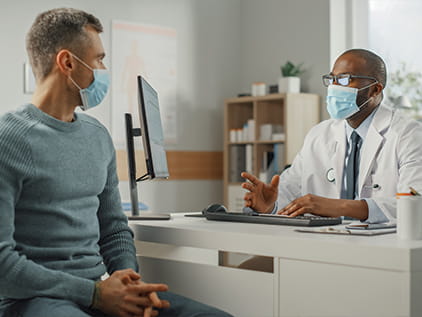Prostate Cancer Survivorship
After your prostate cancer treatment, you may have ongoing health issues that need monitoring. We provide continuing specialized care for your transition from active treatment to daily life as a cancer survivor.
We will review your current quality of life, including mood, overall energy and sexual health, and discuss any concerns you may have. We will do a complete physical exam and provide the results to your primary care doctor.
Our experienced team of doctors, nurses, counselors, dietitians and research coordinators can help you:
- Decide which survivorship programs might be best for you
- Manage any complications
- Limit possible side effects from your treatment
- Check for cancer recurrence
- Give you access to clinical studies
- Make diet and exercise recommendations for better overall health
What is survivorship?
Survivorship describes the “what’s next” in cancer care. Survivorship care begins when your treatment begins – not when you are done with treatment. Leading our survivorship team is Richard “Jake” Fantus, MD, a board-certified urologist whose clinical focus is on men’s health, including hormone replacement and surgical reconstruction. In addition to Dr. Fantus, our survivorship team includes:
- Reconstructive surgeons
- Genetic counselors
- Pelvic floor physical therapists
- Psychologists
- Financial counselors
Our survivorship care includes:
Follow-up cancer surveillance
With prostate cancer, surveillance is often PSA testing at regular intervals. Sometimes we may also use imaging to monitor your prostate cancer. Your treating physician will determine the specific combination of tests and frequency.
Managing treatment side effects
Direct side effects of treatment can include changes in urinary function (urgency, frequency, incontinence), sexual function (erectile dysfunction and orgasmic dysfunction), fertility problems, hormone-related issues (loss of sex drive, hot flashes), bowel function and overall general health changes.
Mental healthcare
Cancer is mentally and physically challenging. As physicians, we primarily focus on the physical aspects of your cancer, but we know the psychologic toll of cancer can be severe. If you are struggling with your cancer, you are not alone. Our psychologists are here and can help.
Ongoing healthcare
Having cancer is but one part of your health journey. We also want to ensure you receive the highest level of quality care and planning for your overall physical health. This includes making sure you have appropriate primary care access.
We focus on your individual survivorship care needs and assemble the appropriate care team – big or small – to get you the necessary care. Even if you’ve received treatment for prostate cancer elsewhere and need follow-up care, we are here for you and offer second opinion for prostate cancer survivorship. Getting a second opinion from an institution such as ours that offers all prostate cancer treatment options is the right thing to do.
Additional resources
Below are helpful websites you may want to visit to learn more about surviving prostate cancer and where to find support as a prostate cancer survivor:
- Alive2Ride
- American Cancer Society
- Cancer.net (by the American Society of Clinical Oncology)
- National Cancer Institute (part of the U.S. National Institutes of Health)
- Prostate Cancer Foundation
- Prostate Network
- Turning Point
- Zero Prostate Cancer
The University of Kansas Cancer Center does not assume responsibility for any of the information posted on these sites.

Treating cancer with more than medicine
Our approach to cancer care includes support services for the mind, body and spirit. Research shows this approach provides better outcomes.
Start your path today.
Your journey to health starts here. Call 913-588-1227 or request an appointment at The University of Kansas Cancer Center.